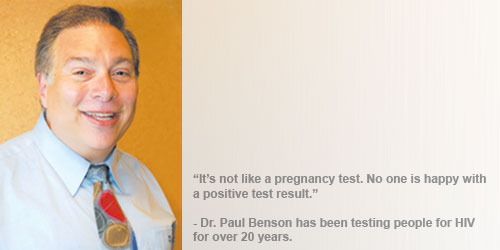
As a doctor, it can be hard telling a patient they are HIV positive. When a person goes in for an HIV test at a clinic, like the Be Well Clinic in Berkley, they meet with a trained consultant who will help prepare them for the news. But still, for some people the news hits hard.
"It's not like a pregnancy test. No one is happy with a positive test result," said Dr. Paul Benson, who has been testing people for over 20 years.
"Sometimes the first words out of their mouth are 'well, I deserve this,'" Dr. Benson said. "I hear this so much more than I expected. 'I deserve it because I slept with so-and-so. I deserve it because I'm gay. I deserve it because God is punishing me.'"
Shock and hopelessness are common reactions. "Populations with low self-esteem, drug users, people who have unsafe sex, think 'well, I may not live another year so why bother changing anything?'"
Dr. Benson and his staff are trained to focus on the patient's needs in that critical moment when they may not know what a positive test result could mean for them. "We are passionate providers and we make sure that people leave our office with a plan they are comfortable with. We set appointments for follow up care and counseling," Benson said. "We let them know that a positive result is manageable if they begin treatment early." He said they look for signs of depression, and they follow up with people who may be avoiding care.
"The strategy is to get people who are positive into treatment. It gives them a higher life expectancy and it significantly reduces the risk of spreading it."
To Dr. Benson and others in the realm of HIV expertise, the lack of support and follow up is what makes an HIV home test problematic.
OraQuick(R) is the first FDA-approved oral swab in-home test for HIV-1 and HIV-2. It's an oral swab test that doesn't require blood and gives a result after 20 minutes. It costs about $40 and is available at major pharmacies. The test allows people to test at their convenience, in the privacy of their own home.
The test is particularly attractive to those who may be deterred by the idea of going to a clinic, or who are in rural areas where they may not have access to free testing or compassionate care.
The marketing also suggests that a home test can be used by couples before being intimate, and the New York Times is reporting that some are already using it to screen prospective bar pick ups. "There are reasons to think that screening might make a difference. Studies have found that a significant minority of people who are H.I.V. positive either lie about their status or keep it secret, infecting unsuspecting partners," the article states. It looked at situations where one might use it to pre-screen partners, and situations where it might fail. For example, if someone were unwilling to wear a condom, they might also be unwilling to take a test. There is concern over what happens if someone gets a positive test result while in the company of someone they may not know very well. How will they react?
The harshest reality of using the test to screen partners is the fact that being HIV free does not mean being STD free. Unprotected sex with a stranger has many risks beyond HIV. Additionally, there is a window of time that someone could be infected but not have enough antibodies to test positive.
Terry Ryan of Michigan AIDS Coalition is not thrilled with the tests either.
"The CDC has tried a home test kit before as the 'end all/be all' solution to this epidemic, so we will see if this one develops any more popularity than the last one," Ryan said. "Cost is another factor. So many inner city clients can't afford to buy one. Also home test kits do not replace the need for outreach efforts to educate clients they might be at risk on the first place. Frankly, the CDC has kept on trying to re-event the wheel, hoping to reach the hard core infected populations. The people who may use this test are likely gay white men with some financial means."
Like Dr. Benson, Ryan's biggest concern was for the people taking a test without an immediate support system in place. "I am concerned about lack of face to face psycho/social support. We had a young client at MAC last week with a positive test who immediately wanted to commit suicide."
The OraQuick website does not list any emotional support resources or nationally recognized resources on their FAQ's page section about HIV resources http://www.oraquick.com/FAQs. It does however have well-thought-out questions like, "What happens if my pet accidentally drank the testing fluid from the test tube What should I do?," "What should I do if I (or my child, friend, or partner) accidentally ate the test stick device?." and "I have discovered a 'cure' for HIV/AIDS. Who can I talk to?"
There is a 24/7 customer support hotline that is included with the test and on the OraQuick website. Find out more at http://www.oraquick.com.
For information on local agencies that do free HIV testing along with support, check out:
Michigan AIDS Coalition at http://michiganaidscoalition.org, and AIDS Partnership Michigan at http://www.aidspartnership.org.










